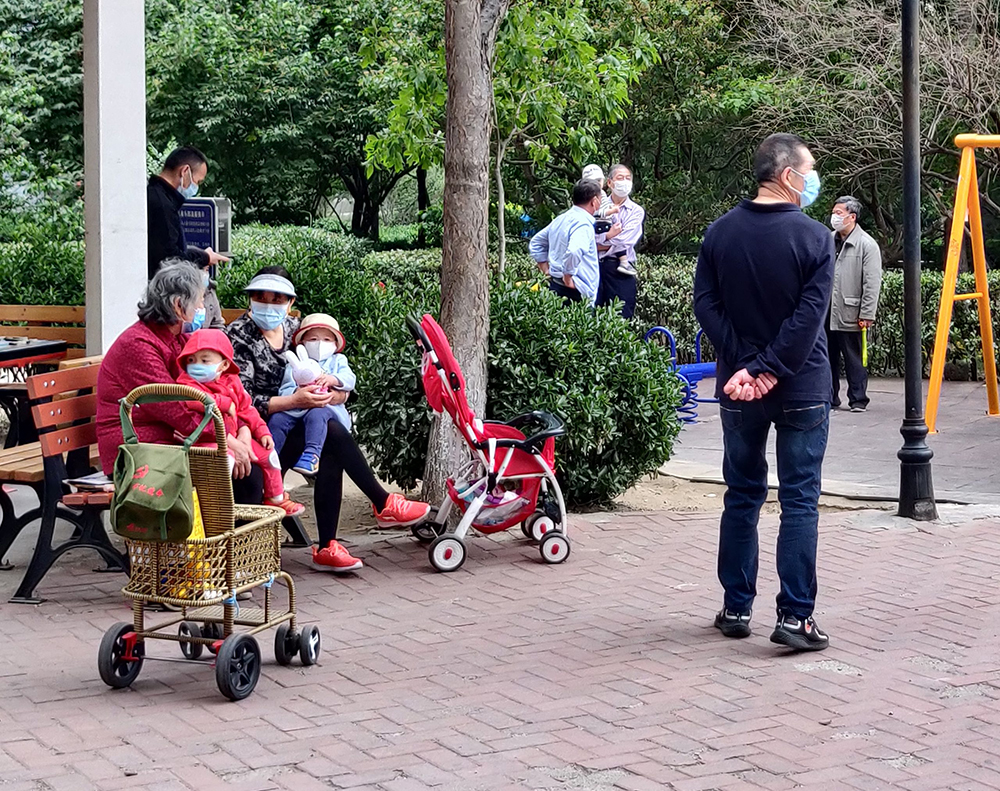Authors: Julien Vincelot and Patrin Watanatada, Bernard van Leer Foundation. The original post is accessible here.
How Covid-19 may affect the youngest city residents for life
Babies and toddlers are vulnerable. They require constant love and care to thrive, along with good healthcare and nutritious food. The science tells us that these first few years of life are foundational for lifelong health, learning and happiness. In many cities, existing inequities make it far harder for some babies and toddlers than others to get the play, love, food or healthcare they need.
The Covid-19 pandemic has amplified many of these inequities. Urban life has been turned upside down, putting great stress on families and reducing their access to services and support systems. For example:
- Access to many essential early childhood services — such as prenatal, post-natal and well-baby clinics, primary healthcare and childcare — has been interrupted. (For more, see our brief on “Five ways health and social services can support babies, toddlers and the people who care for them through the Covid-19 pandemic”.)
- Many people have lost income (see our brief on Five ways Covid-19 economic recovery plans must invest in the next generation), increasing the risk of food insecurity and malnutrition, and leading to rising anxiety and stress. Like everyone, caregivers are experiencing more loneliness and isolation as public life has shifted online or to shouted interactions from balconies and windows. Caregivers who are struggling to cope have far less access to the formal or informal support networks they usually rely on. Rates of domestic violence are spiking.
- Access to public space and nature has been restricted in many cities, affecting caregiver mental health and opportunities for outdoor play — both critical for healthy child development. Where there is still access to public space, it is more a challenge for caregivers with young children to maintain physical distancing from other users of sidewalks and public transit.
The most vulnerable families are typically the worst affected, including families living in heavily polluted urban areas, those in informal settlements, migrant families such as asylum seekers and refugees, homeless families, women and children at risk of domestic violence, and those facing existing discrimination related to race, gender, sexual orientation, ability, or age.

Yet Covid-19 is also showing us elements of a better city for babies and for all
Despite all these negative impacts, the Covid-19 pandemic is also showing glimpses of what a city that works for babies — and for everyone — might look like.
- Walking and cycling — which we consider to be two of the best modes of transportation for families with young children — have gained in popularity, as they are perceived to offer the best chance of maintaining social distance while moving around. In response cities from New Zealand to North America to Europe are emulating Bogotá in rapidly expanding sidewalks and cycling lanes.
- Levels of air pollution, noise, traffic congestion and road crashes — all of which affect babies, toddlers and their caregivers in particular ways — have dropped. For the first time, urban residents are experiencing what cities feel like with far fewer cars on the roads.
- People are realising how much they value easy access to local services and nature — particularly important for urban residents living with small children.
- Mutual aid networks are springing up and communities are trying to support vulnerable members in new ways, reminding us of what a healthy society should look like.
What can cities do?
Families can do much to buffer their young children from harm — from lockdowns or other stressful situations — just by loving them and playing with them. But to be able to do this, families themselves need to be supported by their communities, workplaces and governments. That doesn’t necessarily require new solutions: often, it just means considering the needs of babies, toddlers, and the adults surrounding them more systematically in existing interventions.
Here are six ways for cities to support families during and after Covid-19.
1. Make sure that essential urban services and public goods — sanitation, public space, nature, transit — are directed to vulnerable families with babies and toddlers.
- Expand public access to sanitation for families: this is especially an issue in informal settlements. Kigali has installed temporary sanitation facilities — toilets, showers, clean water, and soap — close to where vulnerable families live. Some of these could be made permanent and expanded to other public spaces.
- Enhance proximity to essential family services and supplies: Ensure that families have access to groceries and baby supplies within a 15-minute walk. Where necessary, expand home delivery capacity — as China has done. Support local stores financially if needed, and allow them to use parking spaces for customers to queue in a distanced way. Distribute food where families face shortages. In Dharavi, Mumbai, local NGOs and community organisations are using their networks to locate and help the most needy families.
- Reclaim space from cars to maintain access to public spaces: Use parking and car lanes to expand sidewalks, like in New Zealand. Expand cycle lanes, like in Bogotá and Paris. Pedestrianize streets for caregivers to take their babies and toddlers outside for play, or open schoolyards as playgrounds for families with toddlers. Tirana is regulating who can use public spaces when, to ensure access to the most vulnerable.
- Adapt public transit: Change protocols to protect bus drivers and other workers from infection. Lower the maximum capacities on trains and buses to allow for distancing. As in Sydney, automate as much as possible (doors, payment, lifts) to reduce the need to touch things. Increase the cleaning frequency on vehicles and in stations.

2. Build urban resilience for the next disaster.
Covid-19 appears to be having worse impacts in cities with air pollution problems, while communities with strong existing networks have proved better to cope. With this in mind, the responses to this pandemic should also look to prepare for future challenges — including potential further waves of the virus:
- Clean up the air in places where families spend the most time: Air pollution especially affects babies, toddlers and pregnant women. Explore ways to keep it as low as possible when lifting travel restrictions, for example by keeping some traffic-calming measures, encouraging working-from-home, making public transit cleaner and safer, or promoting active mobility — like Milan is doing.
- Strengthen community resilience: Build the capacity of existing community networks to spread information and deliver services to families. Connect parents locally via WhatsApp or social media to share ideas and support each other.
- Learn from data on how the crisis affected babies, toddlers and caregivers: A combination of data and empathy is always crucial to make informed decisions that can support the most vulnerable families. The Covid-19 crisis is generating a wealth of new data that can help to inform empathic perspectives, from the impacts of childcare restrictions to changes in mobility patterns and the use of public spaces such as parks when lockdowns are eased.
3. Boost support for caregiver mental health.
Ensure that mental health helplines stay operational, and expand existing services to allow online access. Nurture peer-to-peer support groups and activate social protection and welfare networks to help caregivers access food and economic support. Think specifically about the needs of caregivers working in essential services: what do they need to keep the city running?
4. Protect women and children from domestic violence.
Lockdowns have led to a spike in domestic abuse of women and children: in France, reports are up by 30% and 20% respectively, with “urgent” cases up 60%. In response, France has set up support centres for victims. Providing shelter in hotel rooms is another option.
Strengthen alert systems by providing opportunities to report abuse in services that remain open, such as supermarkets and pharmacies. Enable victims to report abuse discreetly via SMS or internet messaging when they cannot escape being confined with the perpetrator. Maintain hotlines and communicate about the issue on official channels.
5. Make sure families with young children can continue to get key services such as childcare, healthcare, nutrition and early learning.
Many childcare options are no longer available, but some governments are ensuring that essential workers can still access childcare. Some US states are even paying for childcare for essential workers. Paris has offered free childcare for parents working in food-related businesses.
Many organisations are helping parents to access early learning resources online. In New Zealand, the government is providing early years TV programming to reach families without internet access.
6. Provide parenting services digitally or remotely when possible.
Digital means of service provision are often possible — such as telemedicine, or online parent coaching. Parenting services around the world are going online: Tel Aviv’s Digitaf is sharing information related to Covid-19, for example, while Jordan’s Queen Rania Foundation is adapting its parent education programme for delivery via WhatsApp. See our brief ‘Five ways health and social services can support babies, toddlers and the people who care for them through the Covid-19 pandemic’ for more examples.
Additional resources
As the Impact of Coronavirus Grow, Micromobility Fills in the Gaps https://www.itdp.org/2020/03/24/as-the-impacts-of-coronavirus-grow-micromobility-fills-in-the-gaps/
A good explanation of micro-mobility, which is rapidly expanding due to Covid-19.
COVID-19: Transportation Response Centre https://nacto.org/program/covid19/
A global platform of transportation solutions for Covid-19.
Temporary Mobility Changes for the COVID-19 Transition Period in Tirana
https://bernardvanleer.org/app/uploads/2020/05/Designing-mobility-for-the-COVID-19-transition-period-in-Tirana.pdf
Covid-19 response guidelines for transport design in Tirana.
Covid-19 Research by The Centric Lab https://www.thecentriclab.com/covid-19-research
Scientific research on the urban health impact of Covid-19 with a strong equity lens.
Managing Public Space in the New Normal https://gehlpeople.com/blog/managing-public-space-in-the-new-normal/
A study on public space usage in Covid-19 North American epicentre New York City.
Bogotá Expands Bike Lanes to Curb Coronavirus Spread https://www.smartcitiesworld.net/news/news/bogota-expands-bike-lanes-overnight-to-curb-coronavirus-spread-5127
Overview of bicycle lane expansion measures in Bogota, one of the first city to adapt public space to social distancing.
References
- 1 Demographic Yearbook of Poland 2019, Statistics Poland. https://stat.gov.pl/en/topics/statistical-yearbooks/statistical-yearbooks/demographic-yearbook-of-poland-2019,3,13.html
- 1 Demographic Yearbook of Poland 2019, Statistics Poland. https://stat.gov.pl/en/topics/statistical-yearbooks/statistical-yearbooks/demographic-yearbook-of-poland-2019,3,13.html
